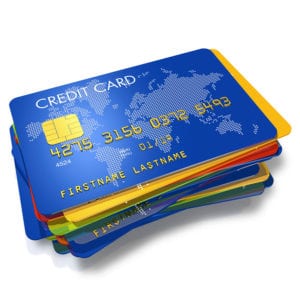Credit Card Transaction Fees for Merchants – Knowledge Center
As a business that accepts credit cards you need to be aware of credit card fees. This is what you need to know about the cost associated with each transaction.
Off the top of your head, do you know exactly which credit card fees your business is being charged for with each customer's swipe? Do you know the process and parties involved?
Or, do you feel like you're blindly paying these charges without a full understanding of them?
Credit cards are such an important way to conduct business these days. In fact, most people aren't carrying cash around with them anymore.
If you want to sell almost any product, credit card transactions are an absolute must, but the fees attached to them can seem confusing.
Never fear! Read on for a complete guide and explanation of the transaction fees that your business is paying every day.
Who is involved with fees charged for credit card companies?
 When the average person uses a credit card, they rarely think about the parties involved.
When the average person uses a credit card, they rarely think about the parties involved.
Here's a breakdown of these parties…
- Credit Card Companies: these are the companies that most people think of when credit card transactions come to mind. Some examples are Visa, Mastercard, and American Express.
- Issuing Banks: they are who issues the credit cards. Wells Fargo is a great example.
- Processors: these are carriers of information between merchants and credit card companies. Processors are also known as “acquirers”. More than one processor may be involved in one transaction.
- Merchant Account Providers: these companies provide total management when it comes to processing a transaction.
How Merchants are charged for these credit card services
Now that you understand who is involved in each transaction, let's delve into how credit card fees work.
Factors that affect fees
Let's go through a few simple factors that have a big effect on how much you pay in credit card fees.
- Merchant provider fees: this is how merchant account providers make money, in addition to the interchange rate. Some additional fees are…
- Setup fees: just like that pesky charge when you set up the internet after moving, some merchant account providers will charge an initial fee, too.
- Monthly fees: providers may charge a fee every month to use toward the costs of security and their own employees.
- Where the transaction occurs: the higher the risk of fraud, the higher the fee to process the transaction. Purchases made in person have a relatively low chance of fraud, so they're less expensive than those that happen online. Another risky move is processing a purchase over the phone, so the fee will be higher there too.
- The interchange rate: the fees of both the credit card companies and the issuing banks. This rate is exactly the same for all business owners.
What has the biggest effect?
Now that you know all the nitty gritty details, here's what affects your wallet the most.
Which merchant account provider you choose has the biggest effect on how much you will get charged in processing fees. Merchant account provider fees can vary greatly, as has been shown above. Unlike the interchange rate, it's totally up to them how much they want to charge.
Taking time to research which merchant account provider to hire for your needs will make the biggest difference in money saved in the long run.
Different types of pricing
Educate yourself with pricing lingo below!
Flat rate pricing, interchange pricing, and tiered pricing are the three different types of pricing that are offered from your merchant account provider.
Here's the deal:
- Flat rate pricing: a single rate that you pay regardless of what kind of card is being processed. This is the most simple pricing option.
- Interchange pricing: you pay both a percentage and a dollar amount that are both a fixed amount above the interchange rate.
- Tiered pricing: this pricing option greatly varies, and depends on which type of card is being used.
Types of credit card fees
Find out each kind of credit card fee you can run into at your business listed below…
- Gateway fees: these fees only apply to those merchants who use internet gateways for payments. This will apply to you if you use e-commerce as an online retailer.
- Monthly base fees: credit card processors may charge a monthly fee that goes toward support and other resources or services you may require.
- Transactional fees: these fees occur for each and every transaction, whether it is accepted or declined by the bank. They can vary depending on the mode by which the card information is entered.
- Incidental fees: if you see that you've been charged incidental fees, that means that a fraudulent or disputed charge has occurred, and the credit card company will demand that you replace this loss. Watch out, because 47 percent of the world's card fraud happens in the U.S.
- PIN transaction fees: when a customer enters their personal identification number (PIN) while using a debit card, a fee occurs.
- Daily batch fees: these fees are only charged when you have a batch of credit card transactions to settle with your processor for the day.
- Voice authorization fees: if you use a telephone service that dials out for authorization of transactions, this fee will apply to you.
- Fees to cancel or terminate: it may seem obvious, but don't forget that you may be charged a fee if you end your account before the agreement.
How credit card companies charge you differently – Visa vs Mastercard


What are Visa's transaction fees?
Well, the interchange rates and assessments (charges made on every transaction performed with any of their credit cards) are the same for every credit card company, so you can't get a better or worse rate on those.
Where the price differs is in the markups. For example, Visa charges 1.51% + $0.10 for card present transactions.
And don't forget that credit card fees can vary greatly depending on the kind of transaction that occurs.
Curious on how to save?
All this info got you curious about comparing prices of different credit card processing services for your business? Check out easy-to-read reviews and comparisons here.
What's next…
Enjoyed this read? Check out some more valuable info for business owners, like tips on opening a credit card for your business.
People the read this also liked:
Best Credit Card Processors Review
Author: Hudson Piccini
Hudson Cynar, a Harvard University alumna and the owner of three prosperous enterprises, is a distinguished business consultant, author, and writer. Her expertise spans multiple business sectors, with a particular emphasis on storage containers, commercial copiers, payroll services, and medical billing software. Dedicatedly investing thousands of hours into product and service research, Hudson crafts insightful reviews to guide entrepreneurs in making informed decisions for their businesses.

